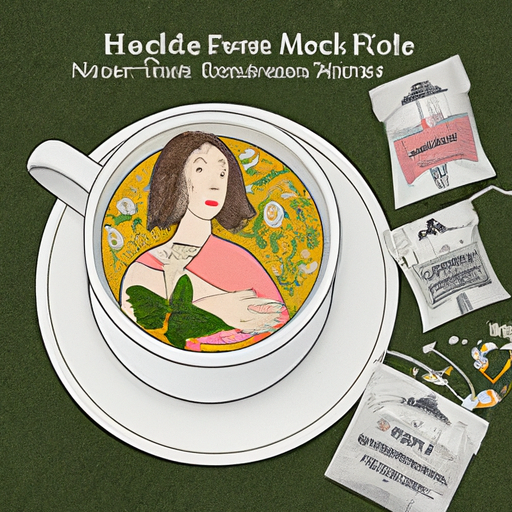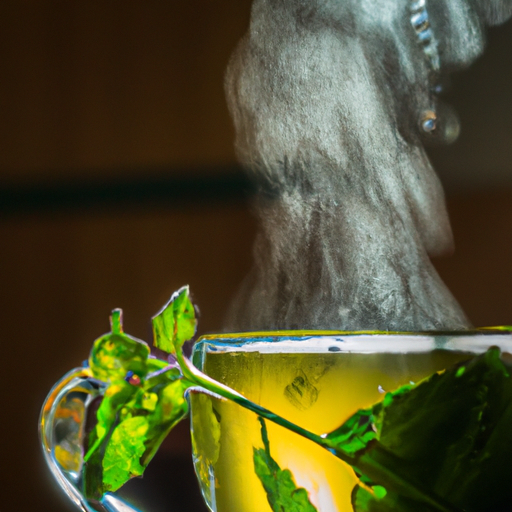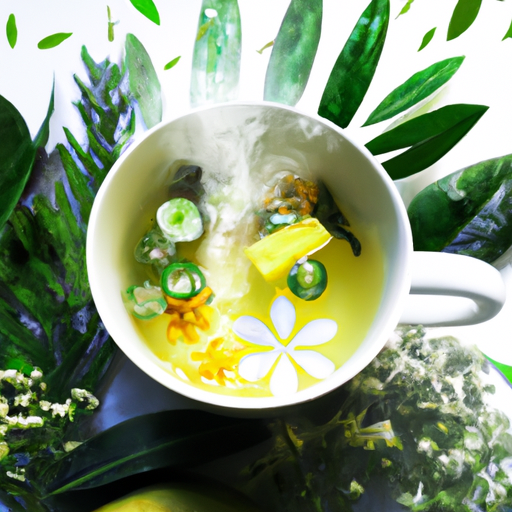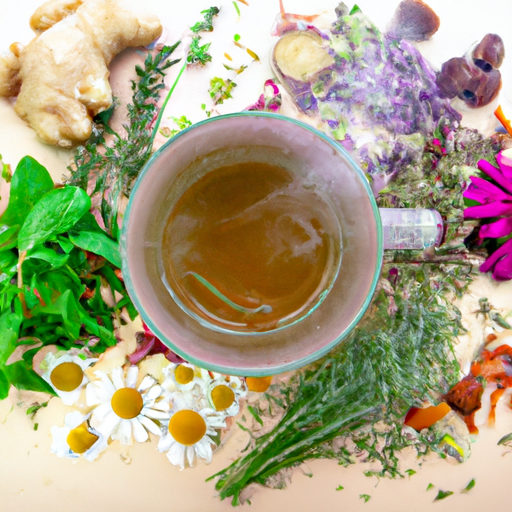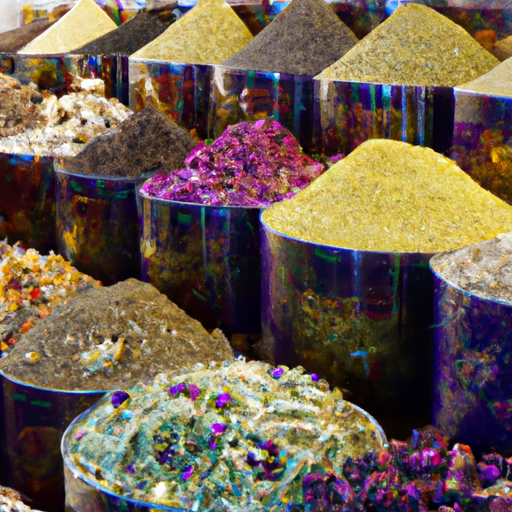As a new mom, navigating the world of breastfeeding can feel overwhelming yet exhilarating. From achieving a proper latch to sustaining a robust milk supply, there are numerous aspects to take into account.
One aspect that often gets overlooked is the impact of herbal teas on lactation. While some herbal teas may have potential side effects or interact with medications, there are several options that are generally regarded as safe for consumption during lactation.
These herbal teas can not only provide a soothing and comforting experience but also offer potential benefits for both mother and baby. In this article, we will explore seven herbal teas that have been deemed safe to consume while breastfeeding.
From the calming properties of chamomile tea to the digestive benefits of peppermint tea, we will delve into the evidence-based research and inform you about the potential advantages and precautions associated with each tea.
So, grab a cup of your favorite herbal tea, and let’s dive into the world of safe and beneficial options for lactating mothers.
Key Takeaways
- Chamomile tea is generally regarded as safe to consume during lactation and provides calming and anti-inflammatory effects.
- Peppermint tea is generally regarded as safe to consume during lactation and can help with digestive issues, but excessive intake may decrease milk supply.
- Ginger tea is generally regarded as safe to consume during lactation and can increase milk supply and improve digestion, but excessive intake may have side effects.
- Fennel tea is generally regarded as safe to consume during lactation and can increase milk production, promote healthy digestion, and relieve colic in infants.
Chamomile Tea
If you’re looking for a soothing and safe herbal tea to enjoy while breastfeeding, chamomile tea is a fantastic choice! Chamomile has been used for centuries for its calming properties, making it a great option for new moms who may be experiencing stress or anxiety.
Additionally, chamomile tea is believed to have anti-inflammatory effects, which can provide relief for any breastfeeding-related discomfort or pain. Incorporating chamomile tea into your breastfeeding routine is simple. You can brew a cup of chamomile tea and enjoy it warm or chilled throughout the day. Some mothers find it helpful to drink chamomile tea before bedtime to promote relaxation and better sleep.
Chamomile tea is a gentle and nourishing option for breastfeeding mothers.
Now, let’s move on to the next herbal tea option – peppermint tea.
Peppermint Tea
Indulge in a warm, comforting cup of peppermint goodness while breastfeeding, knowing it won’t harm your little one. Peppermint tea is generally regarded as safe to consume during lactation and offers several health benefits for both mother and baby.
It can help relieve digestive issues like indigestion, bloating, and gas, which are common during the postpartum period. To prepare peppermint tea, steep a peppermint tea bag or a tablespoon of dried peppermint leaves in hot water for about 5-10 minutes. You can enjoy it hot or cold, depending on your preference.
Be cautious with the amount you consume, as excessive intake may lead to a decrease in milk supply.
Now, let’s move on to the next herbal tea, ginger tea, which also has its own benefits for breastfeeding mothers.
Ginger Tea
Ginger tea, known for its warming and soothing properties, can provide relief from nausea and vomiting, a common symptom experienced by up to 80% of pregnant women. But what about breastfeeding mothers? Well, ginger tea can also offer some benefits for them. It has been traditionally used to increase milk supply and improve digestion, which can be particularly helpful during the postpartum period.
Additionally, ginger has anti-inflammatory properties that may help reduce inflammation in the body. However, it’s important to note that consuming excessive amounts of ginger tea while breastfeeding may have potential side effects. Some studies suggest that very high doses of ginger could potentially decrease milk supply or cause gastrointestinal upset in infants. Therefore, it’s best to consume ginger tea in moderation and consult with a healthcare professional if you have any concerns.
Now, let’s move on to the next topic: rooibos tea.
Rooibos Tea
When breastfeeding, you can enjoy the benefits of rooibos tea as a delicious and caffeine-free option. Rooibos tea has several advantages for breastfeeding mothers.
-
Rich in antioxidants: Rooibos tea contains powerful antioxidants that can help boost your immune system and protect your body from oxidative stress.
-
Hydration: Staying hydrated is crucial for breastfeeding mothers, and drinking rooibos tea can contribute to your daily fluid intake.
-
Calming effects: Rooibos tea has been known to have a calming effect on both the body and mind, which can be beneficial for new moms experiencing stress or anxiety.
To prepare rooibos tea for maximum health benefits during lactation, simply steep a rooibos tea bag in hot water for 5-10 minutes and enjoy it warm or cold.
Transitioning into the subsequent section about ‘fennel tea,’ another herbal tea that is generally regarded as safe to consume during lactation, let’s explore its benefits and preparation methods.
Fennel Tea
Try incorporating fennel tea into your daily routine as it offers numerous benefits for breastfeeding mothers. Fennel tea is known to increase milk production and promote healthy digestion for both you and your baby. It contains phytoestrogens, which can help regulate hormones and stimulate lactation. Additionally, fennel tea has been used for centuries to relieve colic in infants and reduce gas and bloating in breastfeeding mothers.
To prepare fennel tea for lactation, simply steep one teaspoon of crushed fennel seeds in a cup of boiling water for 10 minutes. You can also add a touch of honey or lemon for flavor. It is recommended to drink one to three cups of fennel tea per day to reap its benefits.
Moving on to the next herbal tea, lemon balm tea, it is another safe option for breastfeeding mothers.
Lemon Balm Tea
Lemon balm tea, also known as the ‘calming cup,’ can be a soothing and refreshing choice for breastfeeding mothers. This herbal tea has numerous health benefits that can support lactation and overall well-being. Here are three reasons why lemon balm tea is a great option for nursing moms:
-
Reduces stress and anxiety: Lemon balm tea has natural calming properties that can help alleviate the stress and anxiety that often comes with breastfeeding. It can promote relaxation and a sense of calm, which can be beneficial for both mother and baby.
-
Supports digestion: Many breastfeeding mothers experience digestive issues, such as gas and bloating. Lemon balm tea can aid digestion and relieve these discomforts, thanks to its carminative properties. It can also help reduce colic symptoms in infants.
-
Boosts mood and energy: Sleep deprivation and hormonal changes can affect a mother’s mood and energy levels. Lemon balm tea contains compounds that’ve been shown to uplift mood and enhance energy, providing a natural pick-me-up during this demanding time.
To prepare and enjoy lemon balm tea while nursing, simply steep a teaspoon of dried lemon balm leaves in hot water for about 5-10 minutes. You can sweeten it with honey if desired. This delightful tea can be enjoyed throughout the day to reap its benefits.
Moving on to raspberry leaf tea, another herbal option for breastfeeding mothers…
Raspberry Leaf Tea
For an added boost to your breastfeeding journey, raspberry leaf tea can provide numerous benefits to support your overall well-being. During pregnancy, raspberry leaf tea is often recommended as it’s believed to tone the uterus and prepare it for labor. However, it’s important to note that its effects on lactation aren’t well studied. Nonetheless, raspberry leaf tea is rich in vitamins and minerals such as iron, calcium, and magnesium, which can help nourish your body during the postpartum period.
To prepare raspberry leaf tea for maximum benefits, steep one to two teaspoons of dried raspberry leaf in hot water for about 10-15 minutes. You can drink it hot or cold, and adding a touch of honey or lemon can enhance the flavor. As always, consult with your healthcare provider before adding any herbal teas to your diet during lactation.
Frequently Asked Questions
Can herbal teas consumed during lactation have any negative effects on the baby’s health or development?
Can herbal teas consumed during lactation harm the baby’s health or development? Evidence suggests that while some herbs may have short-term effects like fussiness or gas, there are no long-term negative effects on development.
Are there any specific herbal teas that should be avoided during lactation due to potential risks?
During lactation, it is important to avoid certain herbal teas due to potential risks. Some teas known to be safe for consumption include chamomile, ginger, and peppermint. However, it is always best to consult with a healthcare professional before trying any new herbal teas.
How frequently can herbal teas be consumed during lactation without any adverse effects?
During lactation, it is generally safe to enjoy herbal teas in moderation. The frequency of consumption varies for each individual, but it’s important to note the potential benefits they may have for lactation.
Are there any herbal teas that can help increase milk supply during lactation?
There are herbal teas that can help increase milk supply during lactation. Some natural remedies, such as fenugreek and blessed thistle, have been shown to have herbal tea benefits in boosting milk production.
Can herbal teas consumed during lactation have any impact on the taste or smell of breast milk?
Consuming herbal teas during lactation does not affect the baby’s acceptance of different flavors in solid foods. However, there is limited evidence suggesting that certain herbal teas can alter the color of breast milk.
Conclusion
In conclusion, when it comes to herbal tea options during lactation, there are several safe choices to consider.
Chamomile tea, known for its soothing properties, can help promote relaxation and reduce stress.
Peppermint tea can aid in digestion and relieve any discomfort experienced postpartum.
Ginger tea has been shown to help with nausea and can be beneficial for breastfeeding moms.
Rooibos tea, fennel tea, lemon balm tea, and raspberry leaf tea are also safe options to explore.
So, sip on these herbal wonders and let nature nurture you and your little one. As the saying goes, "A cup of herbal tea a day keeps the worries at bay."

